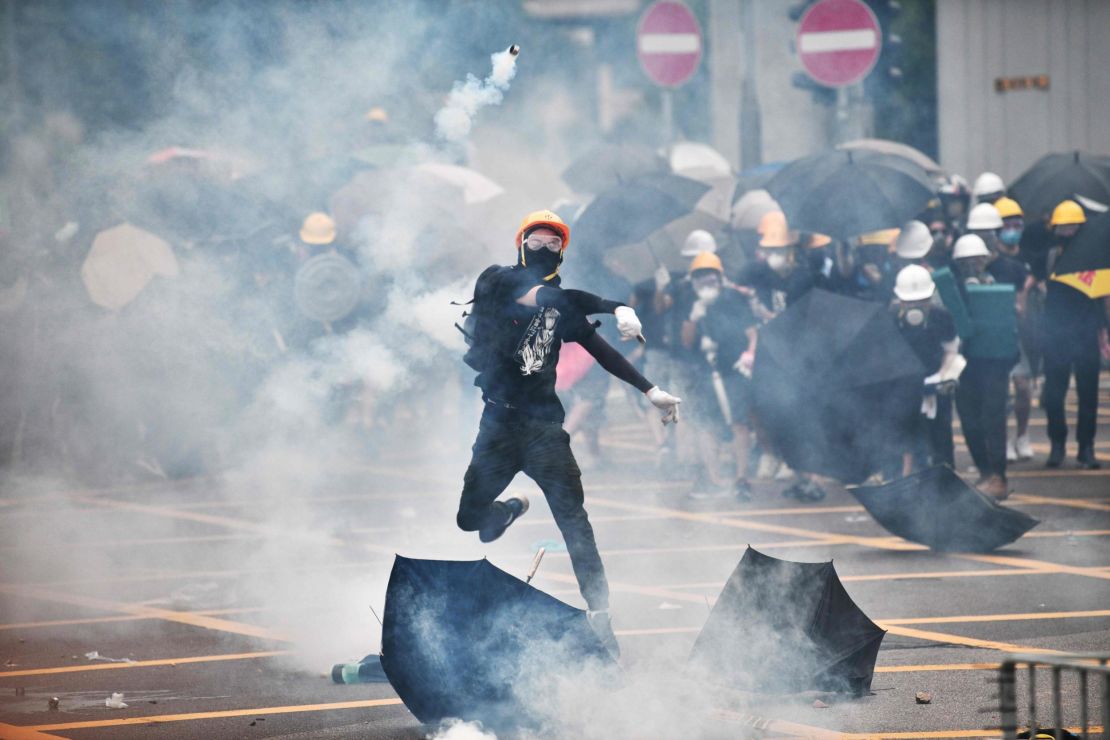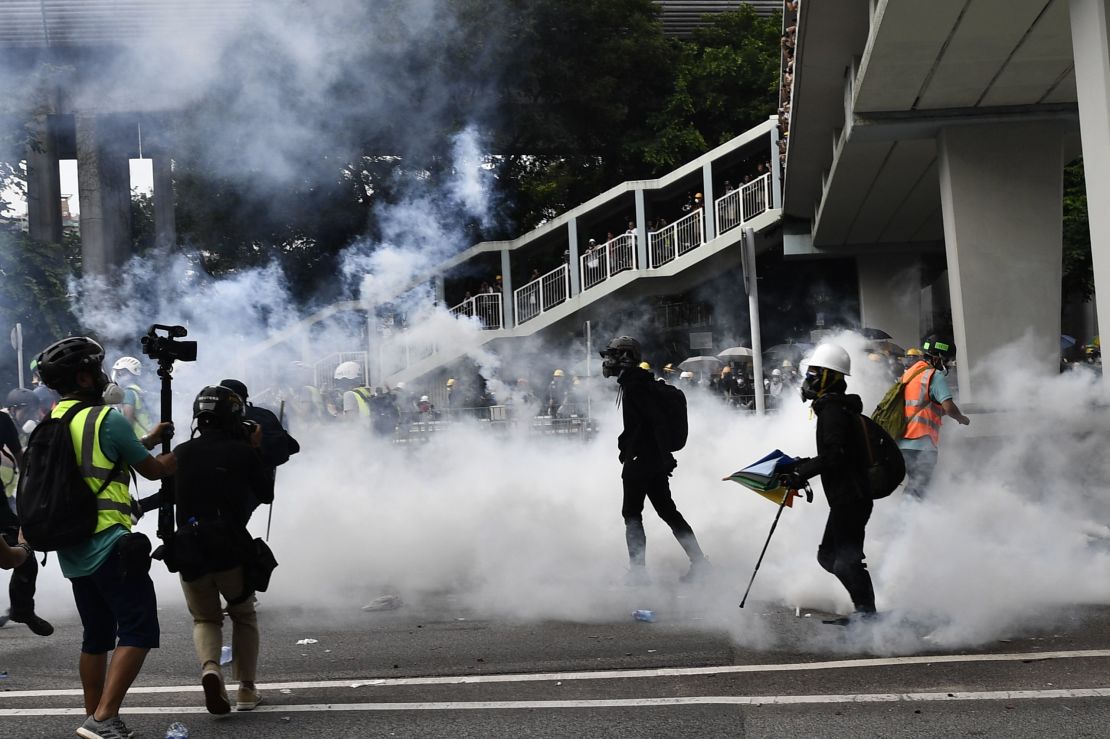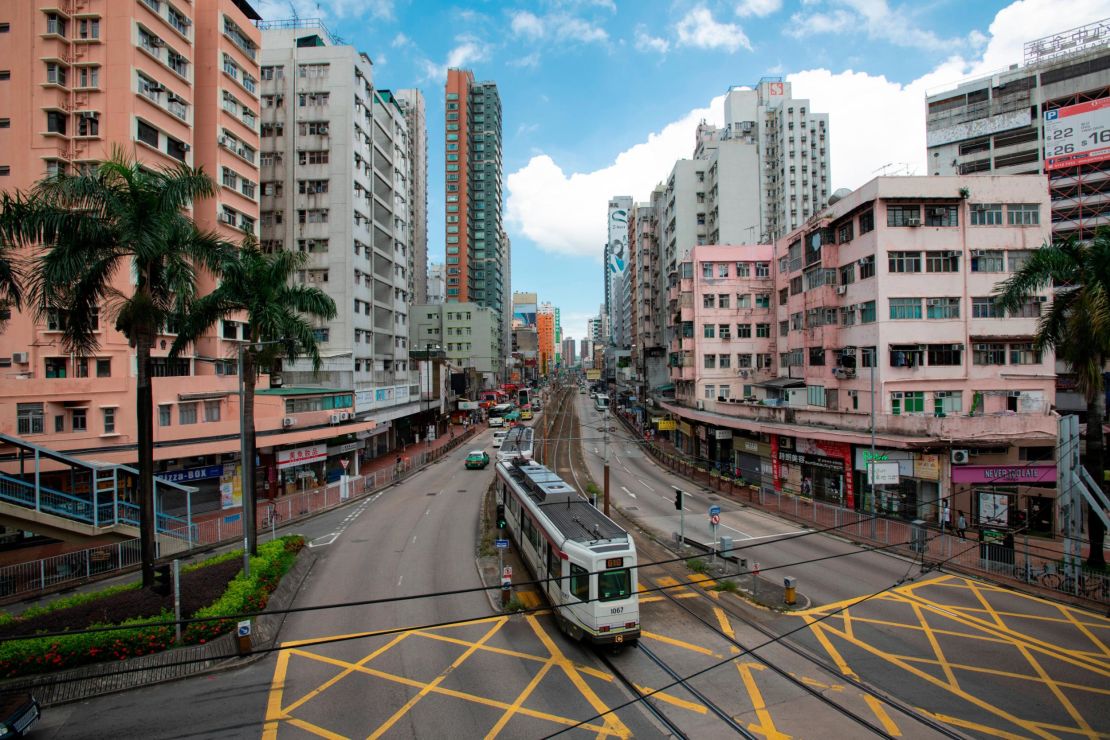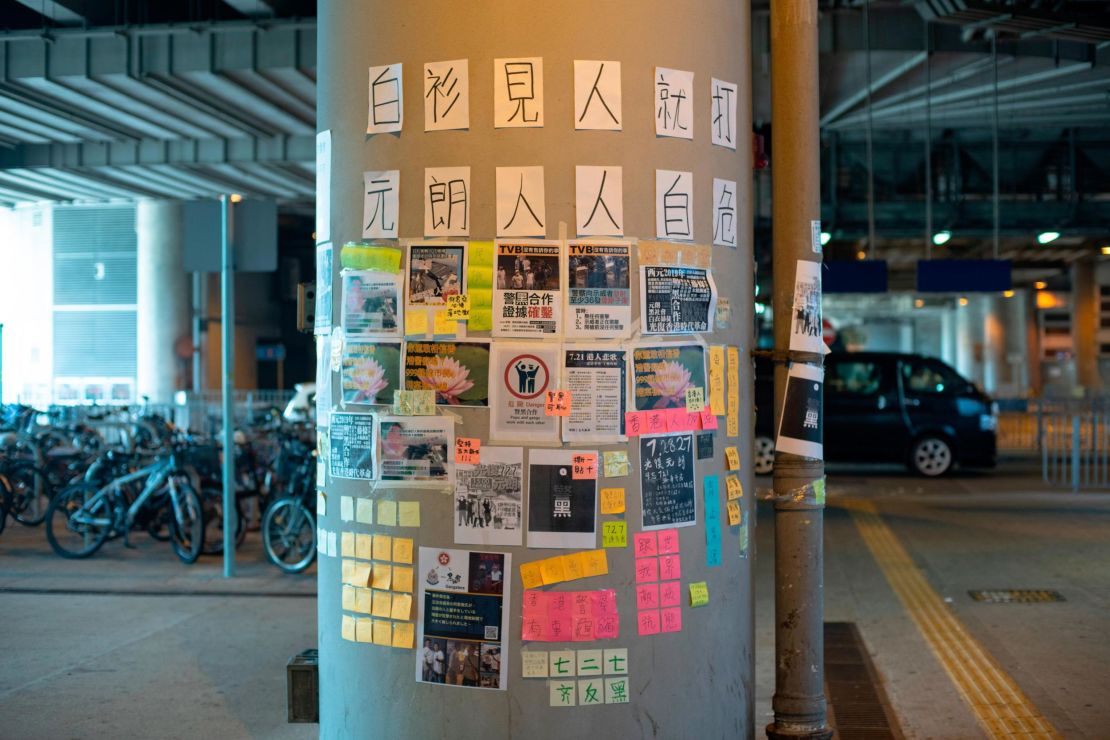Riot police and protesters clashed Saturday in the small town of Yuen Long, near Hong Kong’s border with China, after tens of thousands took to the streets for the eighth consecutive weekend amid an ongoing political crisis.
Yuen Long has become an unlikely focal point of the city’s pro-democracy movement after protesters returning to the town were viciously attacked by a mob wielding iron bars and bamboo sticks last weekend.
About a dozen men have been arrested in connection with the attack, some of whom have links to organized crime groups, or triads. Protesters were reportedly at the mercy of the mob for almost an hour before police arrived and at least 45 people were injured, some seriously.
Police declined to grant protesters a letter of no objection for Saturday’s demonstration, classifying it as an unauthorized assembly, owing to safety concerns.

Despite the apparent unlawfulness of the gathering, tens of thousands of protesters defied police to march through Yuen Long. Protesters, many wearing black, chanted “There is no riot only a tyranny” and “Hong Kong Police, the lawbreakers” as they thronged through the town in sweltering summer temperatures.
Police initially appeared unwilling to intervene, but as dusk approached, hundreds of officers in full riot gear advanced on demonstrators.
The crowd quickly thinned, but a core of several hundred mostly young protesters in hard yellow helmets and protective gear, appeared unwilling to back down – charging police lines and forming barricades.

In response, police fired tear gas and rubber bullets at demonstrators, many of whom had armed themselves with improvised shields and sticks. A small group of front line protesters threw bricks and other materials at police as the two sides fought running pitched battles through the streets.
As night fell, additional riot police advanced from multiple angles slowly pushing demonstrators in the direction of Yuen Long metro station, in a final bid to clear the streets. Chaos briefly reigned inside the station when riot police charged up the stairs with batons, hitting protesters and using pepper spray.
Twenty four people between the ages of 15 and 60 were hospitalized following the clashes, authorities confirmed. On Sunday morning, six remained in hospital with two men in a serious condition.
In statement Saturday, Hong Kong police reiterated that the demonstration had been an “unauthorized assembly” and accused protesters of throwing bricks and “hard objects” at officers during violent clashes.
On Sunday, police arrested alleged protest organizer Max Chung.
Senior Superintendent of the Police Public Relations Branch Yu Hoi-kwan said at a press conference: “Mr Chung … clearly understood that police objected to the event. Because he clearly understood this but he remained present in the event and, based on the behavior of him on that day, we arrested him.”
Despite Saturday’s scenes of violence, thousands of demonstrators wearing black – the color of the protest movement – came back out Sunday to attend a planned protest on Hong Kong Island.
Horrified by the violence
In the wake of last weekend’s mob attack, residents of Yuen Long, speaking on the condition of anonymity for fear of retribution, said this week that they had been horrified by the ongoing violence.
“I never thought this would happen (here),” said one shop employee. “The Yuen Long of my memory is a place full of warmth. Everyone is very friendly, people will always help each other.”
Yet while many locals condemned the clashes, they also objected to Saturday’s protest out of concern for local business and disruption to the suburb. In advance of Saturday’s protest, many shops and facilities in Yuen Long closed.
“Villages are very traditional,” said a butcher. “They don’t tolerate people who mess up their community. You have to be considerate on this matter.”
The protest in Yuen Long follows a large peaceful demonstration at the city’s international airport, Friday night. Thousands of protesters joined aviation staff in occupying the arrivals hall, where they greeted passengers with chants of “Free Hong Kong” and “Justice for victims of brutality.”
Border town
Located less than 10 kilometers (6 miles) from Hong Kong’s border with China, Yuen Long is closer to mainland China than it is to Hong Kong’s iconic Victoria Harbor.
The area is known for smuggling, both of goods and people, while decades of police operations to combat triads, which operate on both sides of the border, have failed to stamp out organized crime in the area.

The role of alleged triad members in the attacks on protesters came as little surprise to researchers, who pointed to the common practice of using “thugs for hire” in mainland China. Local officials have even faced allegations of working with the criminal gangs.
“We call this extra-legal governance – sometimes when governments cannot use the formal law enforcement for whatever reason, they pay for it,” said T Wing Lo, an expert in triad societies at City University of Hong Kong. “This is the normal way to do business.”
Lo said the group who carried out the attack in Yuen Long would likely have been paid by Chinese authorities.
Police Commissioner Stephen Lo on Monday denied accusations that law enforcement officials were working with gangs. “We will investigate whether we were inefficient but we are not related to triads. I ask you to trust the police force,” he said.
That alleged link between Hong Kong Traid groups and mainland Chinese authorities goes back decades.
In the wake of the Tiananmen Square massacre of 1989, some gangs were involved in smuggling democracy leaders out of China, but following this in the years up to the 1997 Hong Kong handover, Beijing embarked on a “deliberate strategy to woo the Triads into the pro-Beijing camp,” which included granting business opportunities to leaders in exchange for support in Hong Kong.
No end in sight
Saturday’s march marks the eighth consecutive weekend of major protests in Hong Kong, during which hundreds of thousands of people have taken to the streets.
Initially, protesters were demanding the withdrawal of a now-shelved extradition bill, but the demonstrations have evolved to include calls for greater democracy, an independent investigation into alleged police brutality, and the resignation of the city’s leader, Carrie Lam.
As the summer of unrest has heated up, violence from protesters and police has become a more common sight, with tear gas, rubber bullets and pepper spray used on July 21 after protesters threw bricks and pushed into police lines.
Last week, police raided a warehouse in an industrial area of the city, seizing a large cache of high-powered explosives, petrol bombs and other weapons. Three men, in their twenties with alleged links to a pro-independence group, were arrested in connection with the seizure.

The possibility of Chinese military involvement has also been raised. During a press briefing earlier this week, a Chinese Defense Ministry spokesman said the People’s Liberation Army (PLA) – which has a large but discreet presence in Hong Kong – was monitoring the situation closely.
Wu reminded journalists of the Hong Kong law that allows the local government to request assistance in maintaining public order from the PLA garrison in the city, but did not suggest troops would be deployed.
His comments were greeted with alarm by some in Hong Kong and Washington, with US lawmakers James McGovern and Marco Rubio issuing a joint statement that “escalation of violence – whether on the part of organized crime thugs or the PLA – will only further undermine Hong Kong’s autonomy and rule of law.”
CNN’s Helen Regan and Maisy Mok contributed reporting.


















